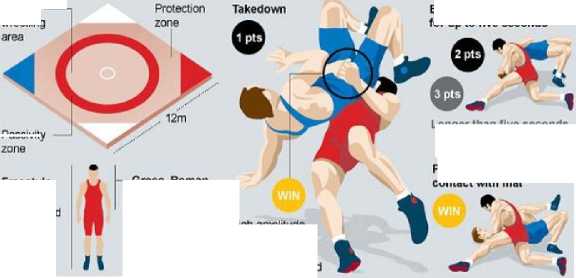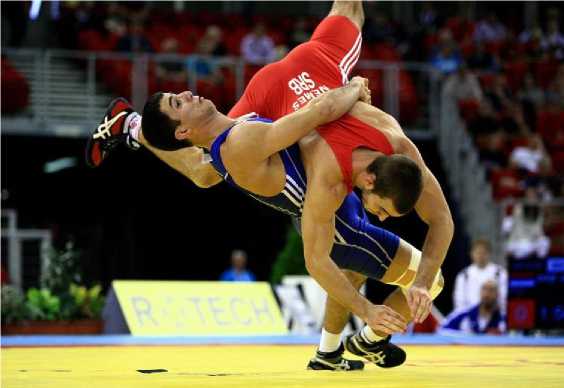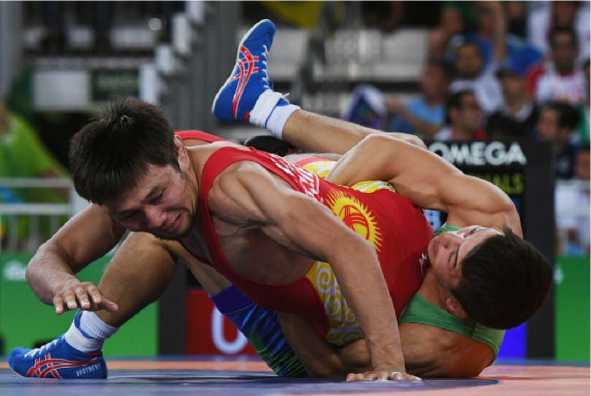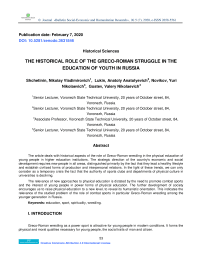The Historical Role of the Greco-Roman Struggle in the Education of Youth in Russia
Автор: Shchetinin Nikolay Vladimirovich, Lukin Anatoly Anatolyevich, Novikov Yuri Nikolaevich, Gostev Valery Nikolaevich
Журнал: Bulletin Social-Economic and Humanitarian Research @bulletensocial
Статья в выпуске: 5 (7), 2020 года.
Бесплатный доступ
The article deals with historical aspects of the role of Greco-Roman wrestling in the physical education of young people in higher education institutions. The strategic direction of the countrys economic and social development requires new people in all areas, distinguished primarily by the fact that they lead a healthy lifestyle and establish civilized forms of production and interpersonal relations. In the light of these trends, we can only consider as a temporary crisis the fact that the authority of sports clubs and departments of physical culture in universities is declining. The relevance of new approaches to physical education is dictated by the need to promote combat sports and the interest of young people in power forms of physical education. The further development of society encourages us to raise physical education to a new level, to reveal its humanistic orientation. This indicates the relevance of the studied problem of the role of combat sports in particular Greco-Roman wrestling among the younger generation in Russia.
Education, sport, spirituality, wrestling
Короткий адрес: https://sciup.org/14114720
IDR: 14114720 | DOI: 10.5281/zenodo.3631846
Текст научной статьи The Historical Role of the Greco-Roman Struggle in the Education of Youth in Russia
Greco-Roman wrestling as a power sport is attractive for young people in modern conditions. It forms the physical and moral qualities necessary for young people, the social traits of man and citizen.
The wide educational, health and educational role of wrestling served as the basis for its introduction into the curricula of secondary special and higher educational institutions, which train specialists in physical education and sports. In order to get the most general idea of wrestling, you should familiarize yourself with the history of its origin and development, with its varieties, consider their features from the perspective of modern scientific views on wrestling as a sport, as an educational discipline and as a subject of research.
II. METHODOLOGY
The methodological basis of the study is the provisions of modern philosophy, history, psychology and pedagogy in the field of the theory of cognition and personal development. The article was based on the system-historical and system-structural approaches to the analysis of the presentation of the material.
The research methods were: a retrospective analysis of historical sources, the study, processing and systematization of archive data, a survey (interview, conversation). The accumulated materials were subjected to analysis, generalization, classification and systematization.
Materials on the history of the formation and development of Greco-Roman wrestling as a sport, systematized and generalized in this study, can be included in the lecture course of the departments of physical education that cultivate Greco-Roman wrestling, in the content of theoretical educational material.
III. DISCUSSION
The history of the development of wrestling in Russia has extensive experience in training wrestlers of the highest qualifications, the comprehensive development of the personality of athletes. For example, in the sports and coaching activities of the outstanding wrestler Georg Lurich there was a lot of what is considered today at the level of pedagogical innovations: issues of the moral education of athletes, the humanization of sports, the promotion of a healthy lifestyle, the absolute exclusion of smoking and drinking, the need for harmonious, spiritual and physical development, purposeful the formation of strong-willed qualities and more.
The most important information on this issue is contained in the works of V.A. Pytlyasinskogo (1896), A.F. Guretski (1913), G.G. Gackenschmidta (1915) and other authors. But the information collected is relatively fragmented, it is not summarized in the corresponding system, reflecting the formation and development of the Greco-Roman struggle at different stages of the historical era. At the same time, various problems of wrestling are actively studied by scientists. In the period from 1940 to the present in our country, about 200 theses on the problems of wrestling have been defended. At the same time, studying the history of the origin and development of Greco-Roman wrestling in Russia during the period from 1900 to 1912 is of particular interest today. First, by the end of the XIX century. the complex process of the formation of sports is being completed in basic features. Sport is becoming an organic part of a developing society. Secondly, at the same time in Europe there were economic, political and social transformations caused by the industrial revolution of European countries. The profound changes that have occurred in all spheres of public life could not but affect physical culture. Thirdly, the knowledge of past periods that are not directly related to our times allows us to understand the unity, as well as the diversity of humanity's creative activity in the field of physical culture.
In recent years, new directions in the study of physical education of students have appeared. This is the development of information and pedagogical technologies in the organization of the educational process (V.Yu. Volkov, L.M. Volkova, A.I. Nikolaev; V.Yu. Volkov, N.V. Inkova; T.A. Evdokimova; A.A. Sidorov, 2000 and others) and the valeological approach to the physical education of students (T.N. Mikhonina, A.A. Mikhonin, D.N. Davidenko, V.V. Trunin, E.V. Musatova, etc.).
IV. RESULTS
There are a number of significant problems in the development of Greco-Roman wrestling in student sports. These are the difficulties of attracting highly qualified teachers and judges to work with students, and the insufficient use of the reserves of the Greco-Roman wrestling itself-its propaganda and popularization.
The main reason for all the problems that arise is the low level of centralized funding, the inefficiency of scientific, organizational and managerial support for student Greco-Roman wrestling in modern socio-economic conditions.
Problems of development of Greco-Roman wrestling in physical education of students are connected with the lack of appropriate pedagogical technologies. There are no centralized programs, guidelines, textbooks and manuals that allow you to effectively solve the problems of the development of Greco-Roman wrestling at the University. There is no progress in working with the women's contingent.
WRESTLING Competitors go head-to-head in displays of stregnth power and technique.
if a wrestler wins by a margin of six they can be granted technical superiohty* victory.
COMBAT AREA
SCORING
Expose shoulders to mat for up to five seconds
Central ----- wrestling

Passivity
High amplitude takedown Opponents feet go above his head
Freestyle wrestling Ail standard holds and techniques allowed
Greco-Roman wrestling Holds above hips only.
Not allowed to use your legs in a hold
Longer than five seconds
Pin both shoulders in contact with mat
The main reasons that hinder the development of Greco-Roman wrestling in the system of physical education of students are the same as in the development of student sports, plus the lack of understanding and support from the University administration.

Ways to improve the effectiveness of the development of Greco-Roman wrestling in student sports and physical education can be outlined based on the identified patterns of development of wrestling as a sport, knowledge of the main problems of Greco-Roman wrestling in student sports and best practices in organizing classes and competitions among students in Greco-Roman wrestling.
The activation of students ' motivational and value relations to Greco-Roman wrestling has shown its high efficiency. Work in this direction requires taking into account long-term and short-term value orientations of students who find a connection with gender, age, course of study and sports qualifications of students.

The most important direction in working with wrestlers is the use of competitive potential in the formation of personality. Competitions are a powerful factor in increasing the motivational and value attitude of students to Greco-Roman wrestling and form socially significant qualities: emotional satisfaction and motivation for achievement, contribute to the development of reflexive skills, the ability to self-regulation, and adaptation to a dynamic environment.
V. CONCLUSION
The study developed organizational and methodological tools of the pedagogical process as the basis of technology in teaching Greco-Roman wrestling at the University. The program content of Greco-Roman wrestling is offered, taking into account the course of training and sports qualification. The issues of planning and organizing classes with students were studied.
The method of initial training and self-improvement of students in Greco-Roman wrestling, as well as the method of training athletes, was developed.


